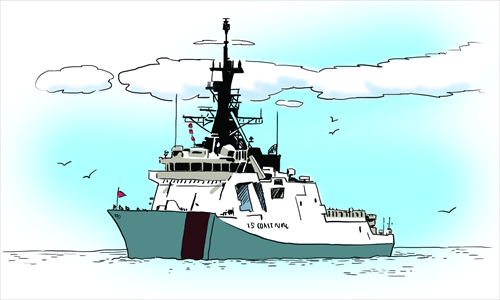Maritime emergencies require armed and ready coast guard

There have recently been debates around whether China should enable its coast guard to carry out armed law enforcement. Some scholars believe that China should insist on peaceful principles within its exclusive economic zone, and refrain from armed law enforcement in the zone as the US, Japan and South Korea do. But other scholars hold that it's urgent for China to strengthen its marine law enforcement forces.
For my part, because of the universality and complexity of marine jurisdiction, it would be difficult for marine law enforcement agencies to do their job without weapons.
The preamble of the United Nations Convention on the Law of the Sea mentions that the convention was established to "promote the peaceful uses of the seas and oceans." The Article 301 of the convention, which is titled "peaceful uses of the seas," says that in exercising their rights and performing their duties under this convention, state parties shall refrain from any threat or use of force against the territorial integrity or political independence of any state, or in any other manner inconsistent with the principles of international law embodied in the Charter of the United Nations.
Therefore, the principle of peaceful use is not a special principle aimed at only exclusive economic zones but at the entirety of the oceans. So the argument which denotes the peaceful use applying to exclusive economic zones is moot.
The convention stresses that countries cannot use military forces to invade other countries or resolve disputes. But it does not prohibit all maritime military activities. The rational use of military force by national maritime law enforcement agencies is not rejected either.
In fact, the convention even implies that they can be armed. In Article 111, we find that a foreign ship can be pursued when the competent authorities of the coastal state have good reason to believe that the ship has violated the laws and regulations of that state. The right of hot pursuit may be exercised only by warships or military aircraft, or other ships or aircraft clearly marked and identifiable as being in government service and authorized to that effect.
Although the convention does not specifically delineate the use of military force, it allows warships and aircrafts to enforce the law. Doesn't that imply that maritime law enforcement agencies can use military force?
In some documents of international law, using military forces to enforce the law in certain conditions has been explicitly permitted. Therefore, the key issue does not lay in whether law enforcement agencies can be armed, instead, it is how we can rationally use military force.
China's current maritime law enforcement is very scattered. We have many enforcement agencies responsible for different functions such as surveillance, maritime affairs, fisheries, border defense, and anti-smuggling.
These agencies are affiliated to different administrative departments and have different symbols, equipment and jurisdictions.
However, the ocean is a single entity. So the dispersion of China's maritime enforcement system causes many problems such as the overlapping of functions, scattered strength and an oversight vacuum. This is not conducive to marine rights enforcement, international marine law enforcement cooperation and unified response to serious emergencies.
South Korea, Japan, Vietnam and the Philippines are already strengthening their comprehensive maritime law enforcement, which brings urgency to China's mission to develop its own coast guard.
Building China's own coast guard is a complex process which requires step-by-step reforms to combine various functions and lessons to be drawn from other countries.
During the reform, we should pay special attention to establishing a coordinated system between China's coast guard and the Chinese navy.
We needn't deny the relationship between the coast guard and the navy. As early as 1964, the State Oceanic Administration of China was established with the support of the Chinese navy and was temporarily governed by it.
The US, Japanese and South Korean coast guard all have connections with their navies in personnel, equipment, intelligence and command coordination. Russia's coast guard is directly under the leadership of Russia's Border Guard Service.
China should build its coast guard into a strong maritime administrative law enforcement agency with a military nature.
The author is an associate professor at the Shanghai Maritime University Law School. yydong888@yahoo.com.cn